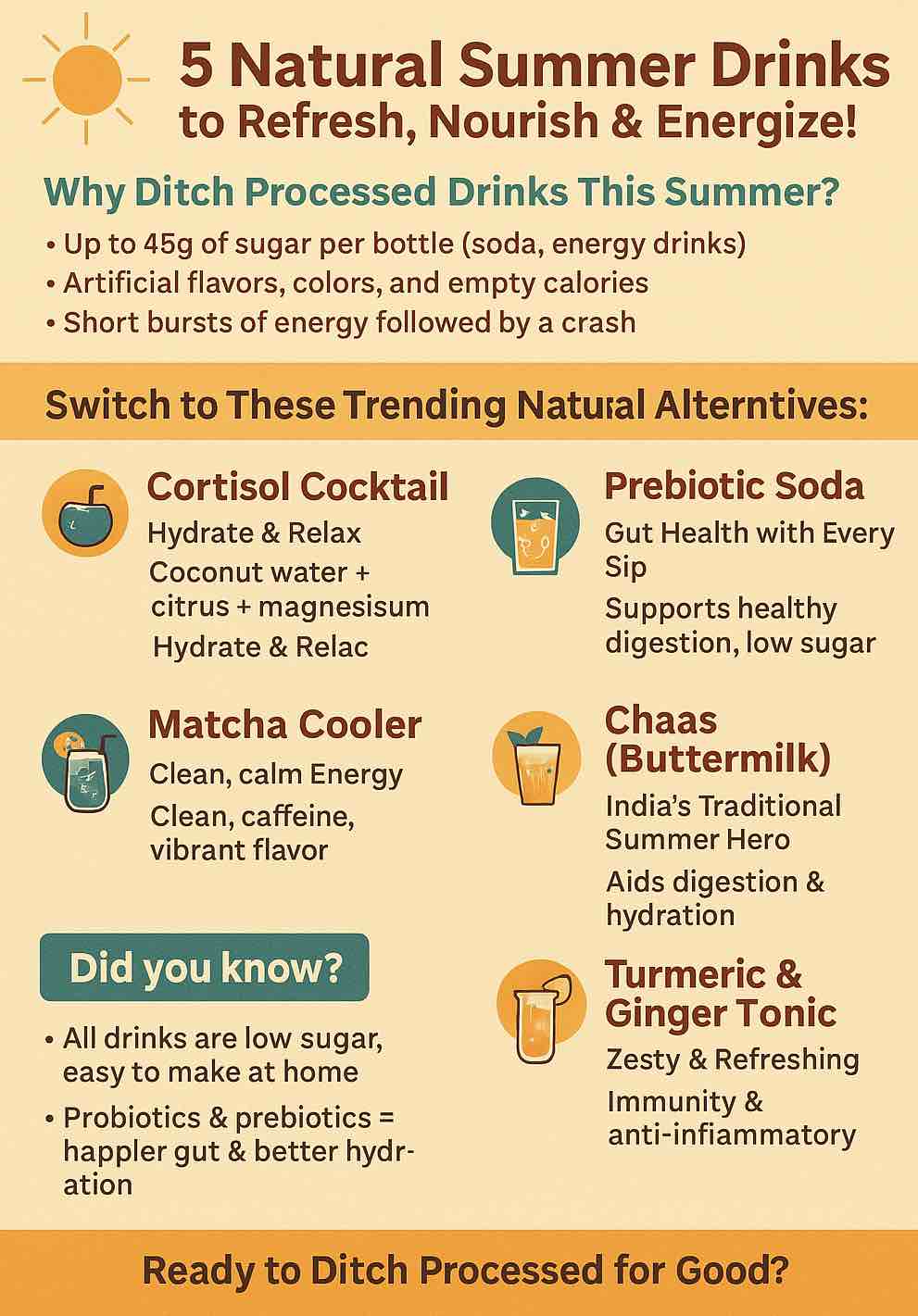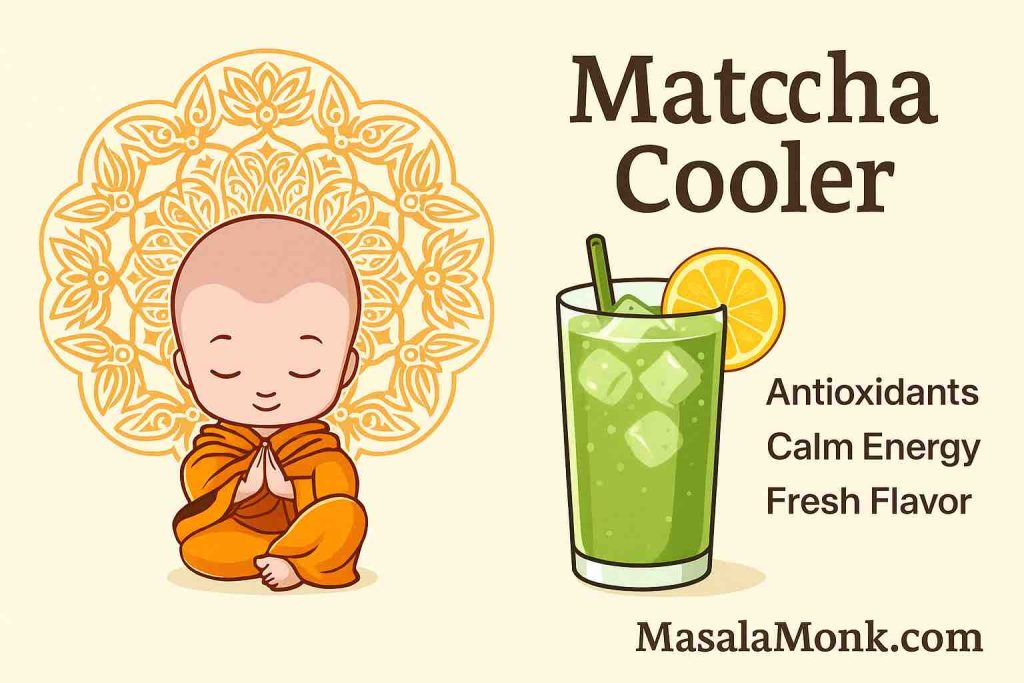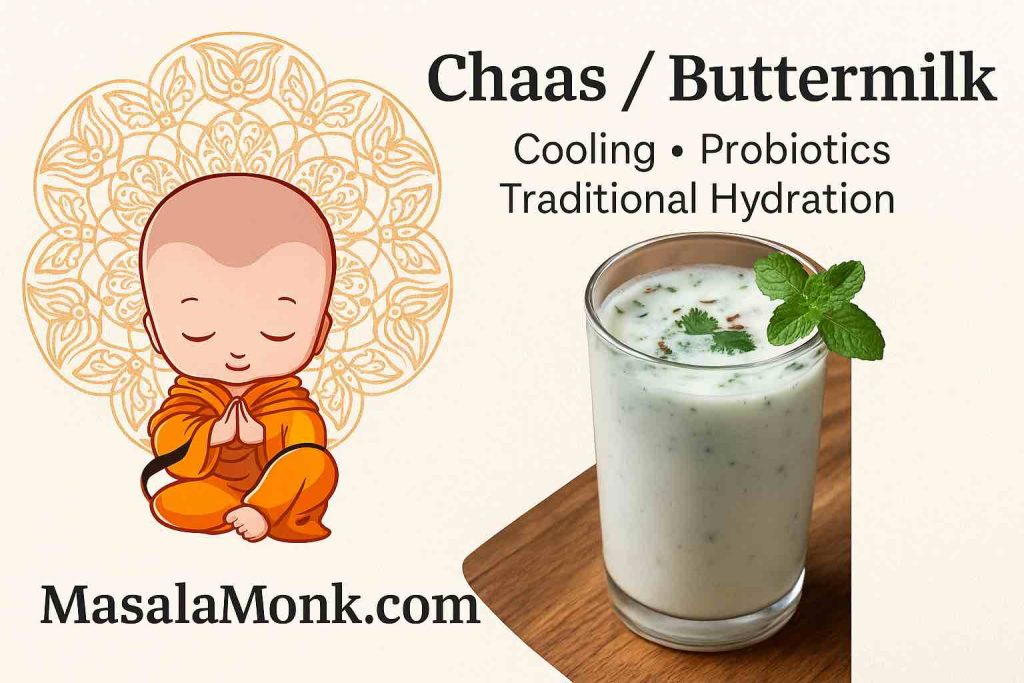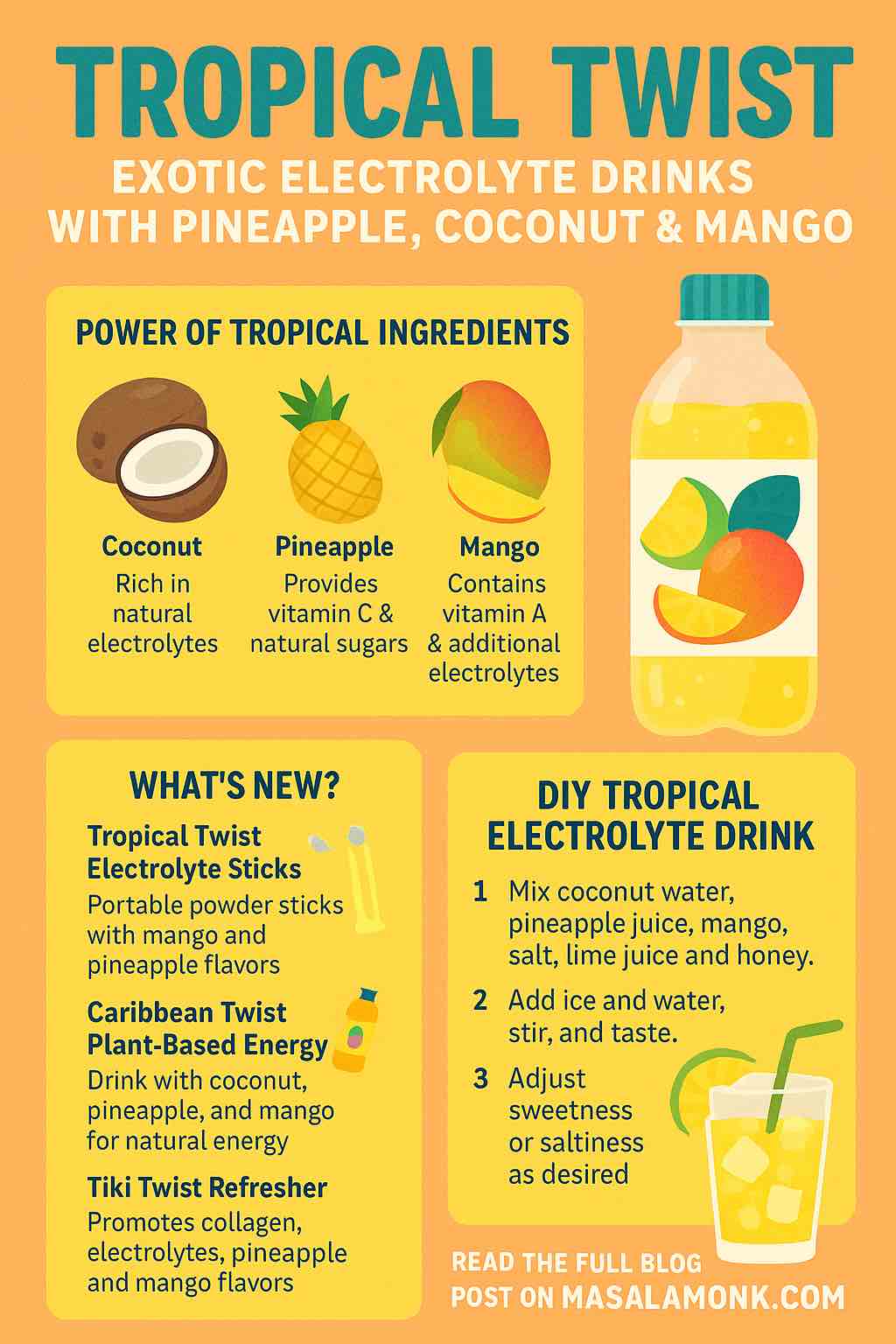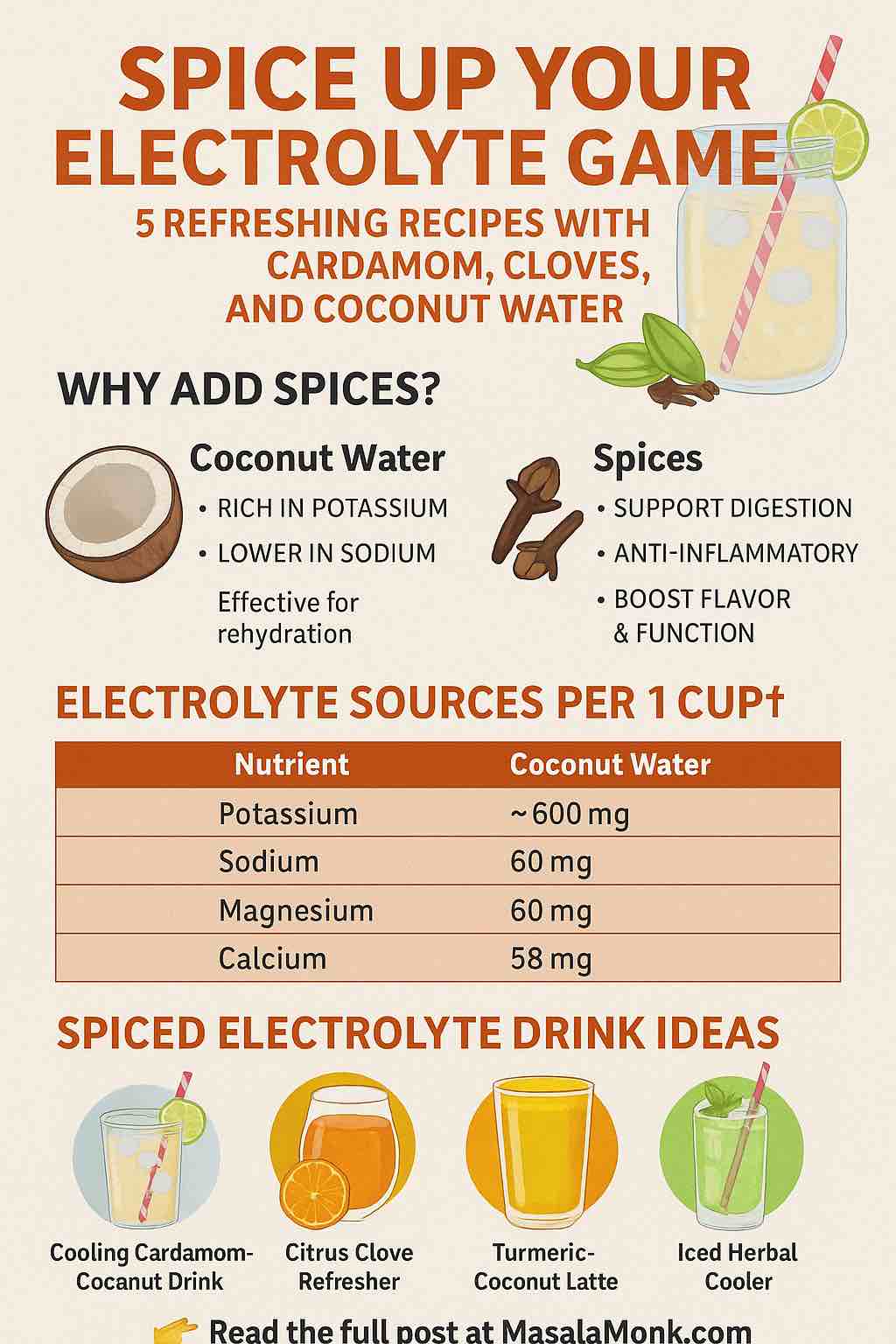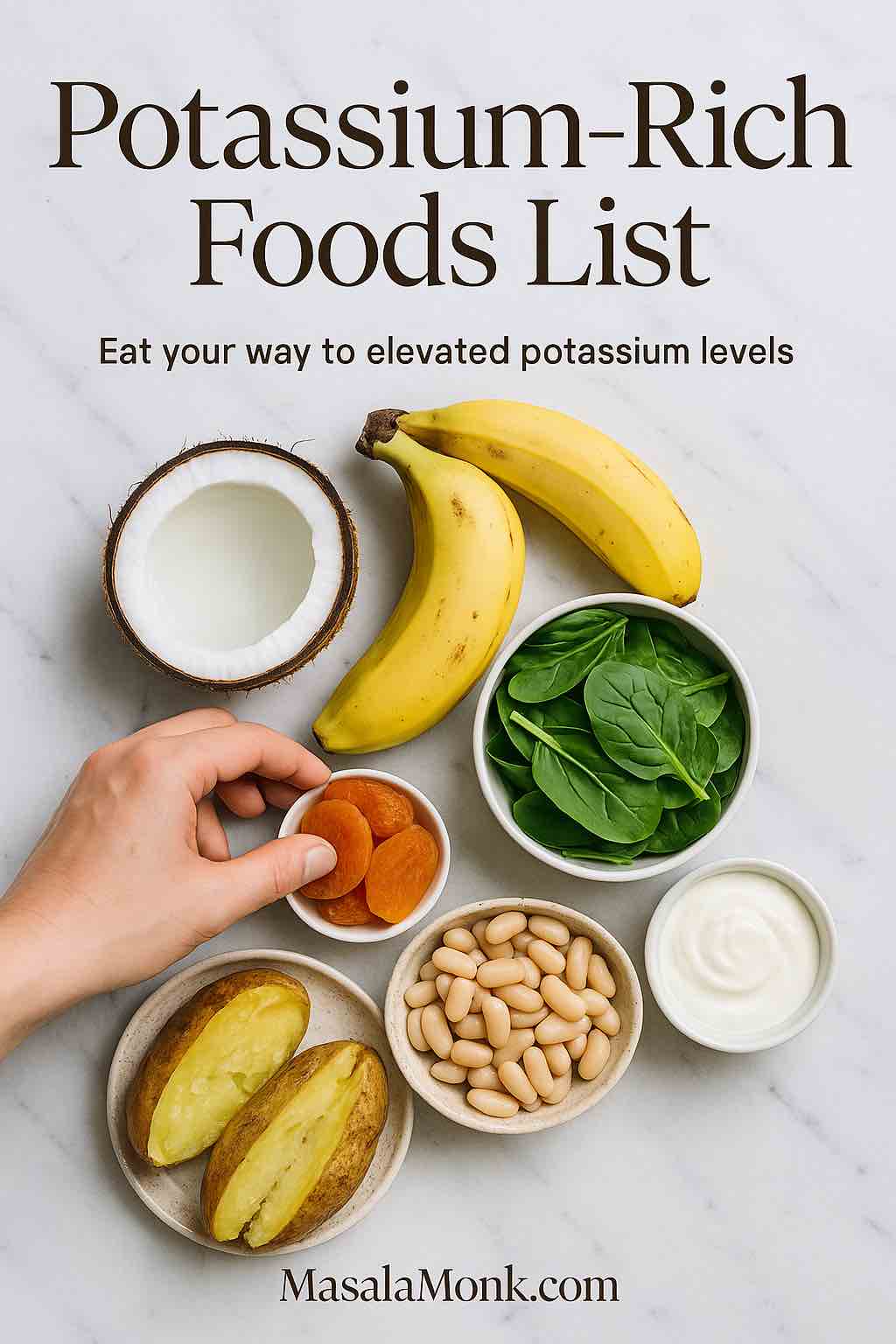
Looking for a practical, trustworthy potassium-rich foods list that translates smoothly into everyday meals? You’re in the right kitchen. This long-form guide focuses on foods that deliver meaningful potassium per common serving, so you can plan, shop, and cook without second-guessing. Along the way, we’ll unpack how much potassium most adults generally need, which fruits and vegetables quietly top the charts, where beans and dairy punch above their weight, and when potassium-forward drinks like coconut water or ORS actually make sense. You’ll also find a one-day plan, friendly shopping notes, and a serving-based table build along in this blog post.
As we go, you’ll notice links to reliable external references (for data you can rely) and MasalaMonk deep dives that turn knowledge into action—think banana potassium breakdown, coconut water buyer’s guide, and DIY electrolyte drink recipes. Read straight through or hop using the table of contents below.
Daily Potassium Needs & Safety (Quick Primer)
Before we dive into the delicious part of this potassium-rich foods list, a brief primer helps set expectations. On food labels, the referenced Daily Value (DV) for potassium is 4,700 mg/day. In practice, Adequate Intake estimates commonly used in guidance sit around 3,400 mg for adult men and 2,600 mg for adult women. Most healthy kidneys regulate excess efficiently through urine; however, this isn’t universal. If you live with chronic kidney disease (CKD) or take certain medications—such as ACE inhibitors, ARBs, or potassium-sparing diuretics—your clinician may assign a lower daily target and specific portion strategies.
For clear, authoritative detail, keep these two bookmarks close: the NIH Office of Dietary Supplements – Potassium (Health Professional) and the more conversational NIH Potassium Fact Sheet (Consumer). Both outline needs, safety, and interactions you’ll want to consider as you adjust your plate.
The Potassium-Rich Foods List You’ll Actually Use
Let’s start with the heavy hitters, ranked conceptually by mg per typical serving. Although bananas are iconic, they rarely lead the pack once you standardize portions. Instead, dependable anchors include cooked beet greens, baked potatoes with skin, white lima beans, cooked spinach, yams, acorn squash, breadfruit, bamboo shoots, and water chestnuts. These staples are easy to fold into weeknight meals and batch-cooking routines.
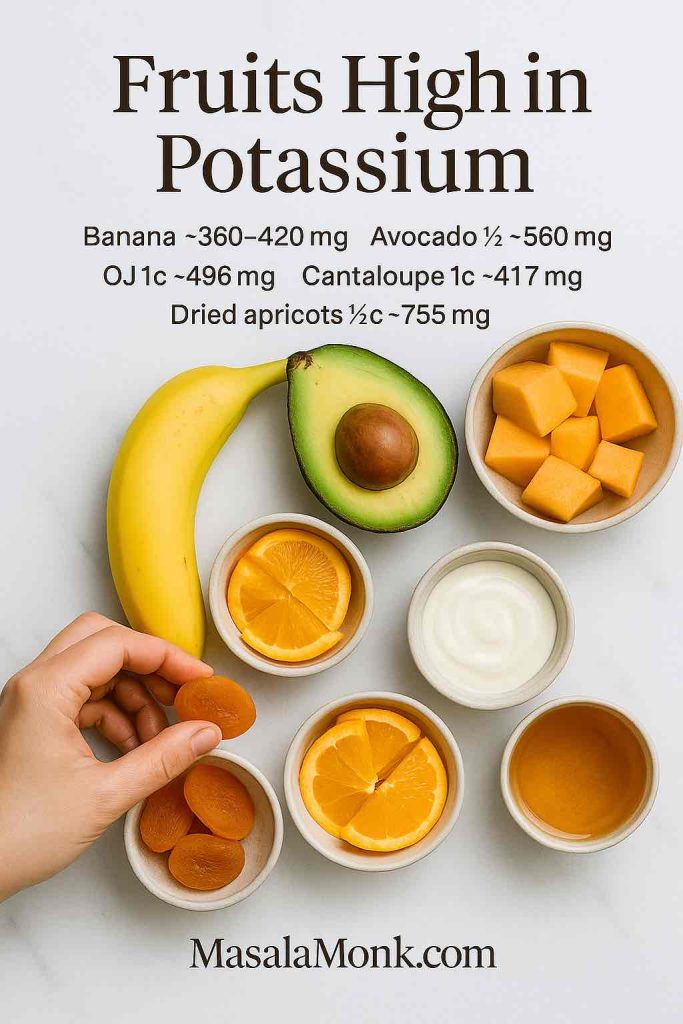
How to translate that into action? Center each meal around one potassium anchor and build flavor around it. Roast a tray of yams or acorn squash on Sunday, then scatter cubes into salads and bowls. Bake a few potatoes while you prep; top with herbs and a spoon of yogurt for a fast, mineral-rich dinner. Fold beet greens into soups, stir cooked spinach into omelets, and lean on white lima beans for stews or quick warm salads. For rigor and numbers you can check, use the searchable USDA FoodData Central database.
Download our FREE Printable PDF of Potassium Rich Foods for quick reference : Click Here.
But What About Bananas?
Everyone asks about bananas, so let’s address them head-on. Depending on size, a banana typically lands in the ~360–420 mg range per fruit, which certainly helps your daily count—especially around training or as part of a balanced snack. Even so, variety wins. Pairing banana with protein and tang can blunt a mid-morning slump; our banana potassium guide explores portion ideas, comparisons with other fruits, and flavor pairings you’ll actually crave.
Fruits & Vegetables Highest in Potassium (Serving-Based)
Planning thrives on realism, so we stick to amounts you’d actually serve: 1 cup cooked vegetables, 1 medium potato, ½ cup cooked beans, and one small to medium fruit. With those portions in mind, the following moves make a high-potassium day astonishingly easy:
- Roast trays of yam or acorn squash on Sunday. Thereafter, fold them into salads, bowls, and wraps for three to four days.
- Sauté spinach in olive oil with garlic until just wilted; a half cup cooked delivers an outsized potassium return for minimal effort.
- Stir beet greens into brothy soups or lentil stews; their mineral edge brightens the pot.
- Add water chestnuts to stir-fries when you want texture and extra potassium.
- Bake potatoes while you prep; the skin not only tastes fantastic but also retains more minerals.
Prefer fruit-first snacks? Consider melon, oranges, or the classic banana paired with yogurt or cottage cheese. And if you want to lean into recipes, our piece on Greek yogurt shows how to balance richness, tang, and staying power.
Where Potassium Hides: Beans, Lentils, Dairy & More
Beyond produce, pulses and dairy quietly support your goals. A ½ cup of pinto beans lands around the mid-300s mg, and milk or yogurt typically contributes ~350–400 mg per serving—useful numbers when you’re assembling bowls or building smoothies. Moreover, legumes pair beautifully with bright acids (lime, vinegar), fresh herbs, and modest dairy to turn simple food into something you’ll look forward to.
For richer textures in curries and soups, skim Coconut Milk – Nutrition, Glycemic Index & Impact and Coconut Milk for Keto Cooking. Both articles show how to harness creaminess while keeping portions sensible within a balanced diet.
Drinks That Deliver Potassium (When, Why & How Much)
Liquid choices can complement your potassium-rich foods list, although it’s easy to overshoot sugar or miss the point of an electrolyte drink. Consequently, context matters.
Coconut water is the standout everyday option for many healthy adults: typically ~500–600 mg potassium per 240 mL (1 cup), plus a touch of natural sweetness. Notably, it doubles as a gentle, food-first electrolyte beverage for light training or hot days. For how to choose a quality brand, avoid cloying blends, and understand benefits beyond potassium, skim The Ultimate Guide to Coconut Water. And if you’re curious about its place in workouts, Electrolyte Elixir: The Science Behind Coconut Water as a Natural Sports Drink breaks down when it shines—and when it doesn’t.
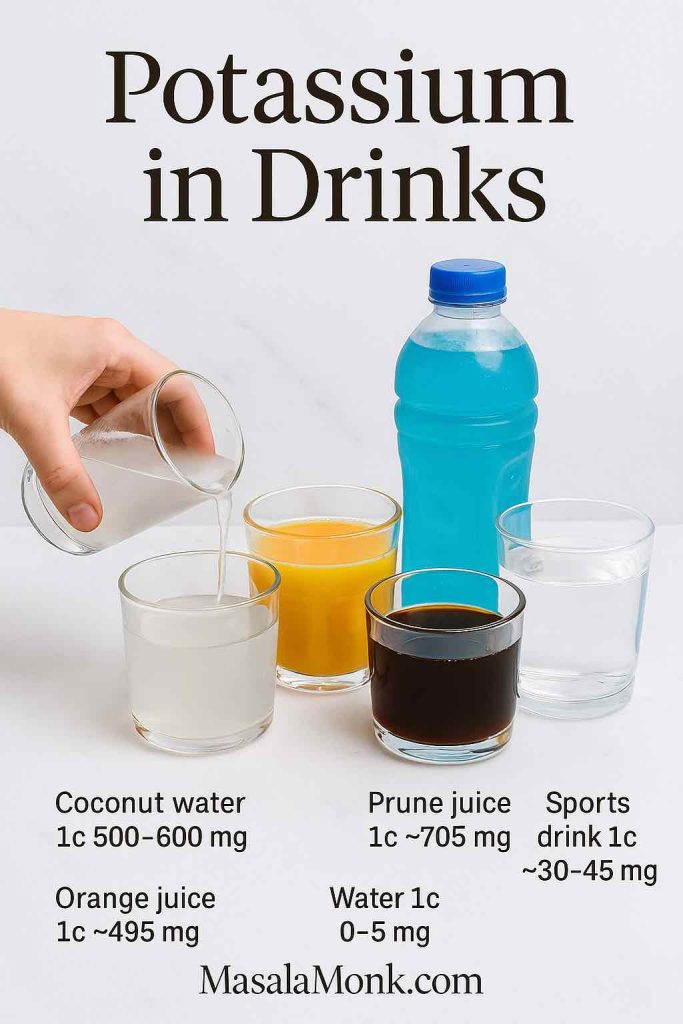
By contrast, Oral Rehydration Solutions (ORS) are built for illness-related dehydration. The WHO’s low-osmolar formula provides a higher sodium load and about 20 mmol/L potassium, intended to correct losses rapidly and safely. Thus, ORS is a therapy, not a daily sipper.
If you’d rather avoid commercial bottles altogether, you’re covered. Try 5 DIY Natural Electrolyte Drinks for mix-and-match templates, Spice Up Your Electrolyte Game for cardamom-and-clove twists, Electrolyte Drinks for Hangovers for morning-after pragmatism, and Cooling Cucumber Electrolyte Quenchers when the day runs hot. Likewise, for cozy evenings, Warm & Soothing Electrolyte Infusions keep hydration gentle and flavorful.
A One-Day Potassium-Forward Meal Plan
Because it’s easier to act on a plan than a principle, here’s a flexible day built from foods you can get almost anywhere. Use it as written, or swap in the foods you prefer—either way, you’ll notice how each meal has a single potassium anchor.
- Breakfast: Greek yogurt topped with banana, a sprinkle of seeds, and a squeeze of lime.
Why it works: yogurt brings ~350–400 mg; banana adds another ~360–420 mg; seeds supply crunch and micronutrients. As a result, you start with a balanced, high-satisfaction bowl. - Lunch: Lentil or bean salad with roasted yam, a fistful of spinach, and a bright vinaigrette.
Why it works: legumes and yams layer potassium while spinach provides a concentrated boost in a small volume; acidity keeps the bowl lively. - Snack: Dried apricots, or a small baked potato wedge with yogurt dip.
Why it works: concentrated foods help you bridge a low-potassium day; meanwhile, portion control ensures you don’t overdo it. - Dinner: Baked potato (skin on) with herbed yogurt and sautéed beet greens; serve alongside grilled fish or paneer.
Why it works: a classic high-potassium dinner with protein and plenty of flavor; it also reheats nicely the next day.
To tighten the blood-pressure angle—especially if your clinician is encouraging food-first strategies—there’s regulatory support you can cite. The FDA recognizes that diets containing foods that are good sources of potassium and low in sodium may reduce the risk of high blood pressure and stroke; you can read the context directly at the FDA health claim explanation. Accordingly, the biggest day-to-day wins come when you add potassium-rich foods and cut sodium in tandem.
Shopping & Prep Notes That Save Time
Even with the best intentions, habits hinge on convenience. Thus, consider a few friction-removers:
- Plan from the anchor. Pick one potassium-dense component per meal (potato, beans, spinach, yam). Thereafter, layer in protein, herbs, and a splash of acid.
- Cook once, use twice. Roast or bake two anchors on Sunday (say, yams and potatoes). Afterwards, plug them into salads, bowls, tacos, or wraps for midweek agility.
- Keep dairy in rotation. If tolerated, milk and yogurt offer ~350–400 mg per serving with minimal prep. In smoothies or raita, they’re a quick pathway to better intake.
- Dial drinks to your day. Coconut water suits casual heat or training; ORS is for illness and heavier losses. Likewise, homemade electrolyte mixes let you control sugar and salt levels; explore a template you can tweak in 5 DIY Natural Electrolyte Drinks.
When to Limit Potassium (CKD, Hyperkalemia & Salt Substitutes)
If your labs show high serum potassium (hyperkalemia) or your clinician has diagnosed CKD, this potassium-rich foods list flips: many “power foods” become items to reduce, portion carefully, or swap. Common high-potassium foods in this context include baked or boiled potatoes and sweet potatoes, tomato products, cooked leafy greens (spinach, beet greens), dried fruits (apricots, prunes), coconut water, and generous servings of legumes. Moreover, label vigilance matters because many “low-sodium” seasonings rely on potassium chloride as a salt substitute.
For pragmatic tactics—leaching techniques for potatoes, portion swaps, and label reading—lean on the National Kidney Foundation’s potassium guidance. And, naturally, keep decisions individualized with your renal dietitian; targets and tolerances vary widely.
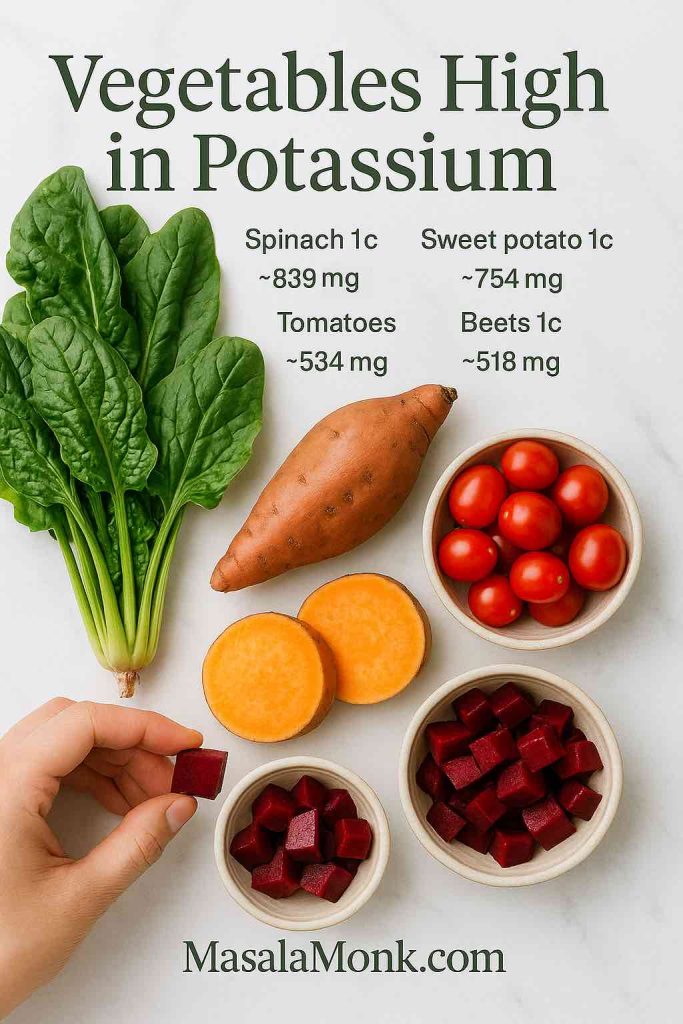
Potassium-Rich Foods List — Serving Chart
The table below is serving-based to mirror real-world portions. Values draw primarily from DietaryGuidelines.gov (Food Sources of Potassium) and the NCBI/USDA tabulation, with specific items cross-checked via USDA FoodData Central and MyFoodData.
To download our FREE Printable PDF of Potassium Rich Foods for quick reference : Click Here.
| Food | Serving | Potassium (mg) | Notes | Source |
|---|---|---|---|---|
| Beet greens, cooked | 1 cup | 1309 | Fold into dal/soups for an easy boost. | DietaryGuidelines.gov |
| Lima beans (white), cooked | 1 cup | 955 | Great in stews and salads. | DietaryGuidelines.gov |
| Potato, baked with skin | 1 medium | ~926 | Top with herbs & Greek yogurt. | DietaryGuidelines.gov |
| Yam, cooked | 1 cup | 911 | Batch roast on Sundays for easy bowls. | DietaryGuidelines.gov |
| Acorn squash, cooked | 1 cup | 896 | Roast & toss with chili-lime. | DietaryGuidelines.gov |
| Amaranth leaves, cooked | 1 cup | 846 | Quick sauté with garlic and mustard seeds. | DietaryGuidelines.gov |
| Spinach, cooked | 1 cup | 839 | Stir into omelets, khichdi, pasta. | DietaryGuidelines.gov |
| Breadfruit, cooked | 1 cup | 808 | Starchy staple; great in curries. | DietaryGuidelines.gov |
| Bamboo shoots, raw | 1 cup | 805 | Add crunch to stir-fries. | DietaryGuidelines.gov |
| Water chestnuts | 1 cup | 724 | Texture + potassium in quick sautés. | DietaryGuidelines.gov |
| Salmon, baked | 1 small fillet | 763 | Pairs well with roasted yam. | NCBI/USDA table |
| Spinach, cooked | 1/2 cup | 591 | Half-cup still packs a punch. | NCBI/USDA table |
| Coconut water (unsweetened) | 1 cup (240 mL) | ~600 | See coconut water guide. | MyFoodData/USDA |
| Cantaloupe, raw | 1 cup | 417 | Great in breakfast bowls. | NCBI/USDA table |
| Milk, 1% | 1 cup | 388 | Easy add-in for smoothies/porridge. | NCBI/USDA table |
| Pinto beans, cooked | 1/2 cup | 373 | Protein + potassium in one spoon. | NCBI/USDA table |
| Yogurt, low-fat with fruit | 6 oz | 366 | Balance with seeds/nuts; see Greek yogurt tips. | NCBI/USDA table |
| Banana | 1 small | 362 | Details: banana potassium guide. | NCBI/USDA table |
| Edamame, boiled | 1/2 cup | 338 | Snack or toss into salads. | NCBI/USDA table |
| Dried apricots | 1/2 cup | ~755 | Concentrated; portion if limiting potassium. | MyFoodData/USDA |
| Potato, baked (medium) | 1 potato (173 g) | ~926 | Nutrition breakdown here. | MyFoodData/USDA |
| Avocado | 1/2 avocado (mashed, ~1/2 cup) | ~560 | Creamy add-in for bowls. | USDA FoodData Central |
| Orange juice | 1 cup | ~496 | Use in moderation if watching sugars. | USDA FoodData Central |
| Prune juice | 1 cup | ~707 | Another concentrated option. | USDA FoodData Central |
Why This Potassium-Rich Foods List Emphasizes “Per Serving”
Some lists rank foods by 100 grams, which certainly standardizes comparisons. Nevertheless, you rarely eat on a scale. In practice, serving-based rankings better match how you shop and cook: a cup of cooked vegetables, a medium potato, a half-cup of beans, a single piece of fruit. Consequently, “mg per serving” helps you visualize a plate, not a lab bench.
Taste, Texture, and the Art of Making It Stick
Good nutrition sticks when it tastes good. Accordingly, think less about discipline and more about design:
- Build contrast. Pair creamy potatoes with bright yogurt and herbs; offset sweet yams with chili-lime crunch.
- Use spice for momentum. A pinch of chaat masala on fruit, cumin on beans, or mustard seeds in spinach can convert “healthy” into “craveable.”
- Keep a default dinner. For example, “hot pan + greens + leftover roasted veg + eggs or paneer,” finished with a squeeze of lemon. In other words, a dependable blueprint means you’ll actually do it.
Likewise, hydration should complement flavor instead of fighting it. On lighter days, a splash of coconut water in a tall glass with ice, cucumber, and mint can be refreshing without being cloying—see Cooling Cucumber Electrolyte Quenchers for easy riffs. Conversely, after tougher sessions or heat waves, lean on recipes from Spice Up Your Electrolyte Game to keep variety high and boredom low.
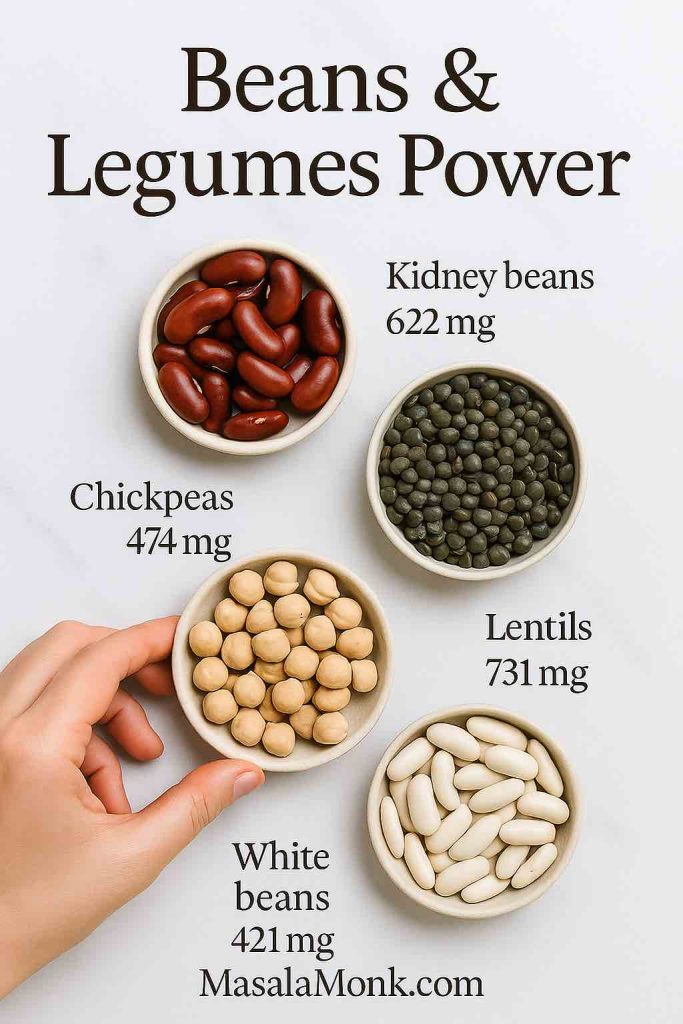
Safety, Interactions & Sensible Boundaries
Because potassium plays a central role in nerve and muscle function—including heart rhythm—excess from supplements can be risky in the wrong context. For that reason, many over-the-counter potassium products cap each serving at ~99 mg, whereas larger, targeted doses are prescribed and monitored when clinically indicated. If you’re considering supplements for cramps or blood pressure, speak with your clinician and skim the NIH ODS overview to understand interactions and contraindications.
Furthermore, when blood pressure is your main concern and your kidneys are healthy, the food pattern with the best evidence pairs higher dietary potassium with lower sodium. To see how regulators frame this, review the FDA’s authorized health claim; then, in your kitchen, make it tangible: swap salty packaged snacks for a yogurt-and-banana bowl, trade one restaurant meal for a home-roasted yam plate, and season generously with herbs, citrus, and spice.
Bringing It All Together
Ultimately, the simplest habit is the most resilient: choose one potassium anchor per meal. A baked potato with skin, a half cup of lentils, a cup of cooked spinach, or a roasted yam will nudge your day in the right direction almost automatically. Additionally, rotate in potassium-aware drinks when appropriate—coconut water’s benefits and buyer’s tips are a great start.
And yes, life is messy. Some days you’ll under-shoot; other days you’ll nail it without thinking. On balance, what matters is the drift of your week, not the perfection of your day. Consequently, set the table with food you enjoy, keep one or two potassium-dense staples prepped, and let taste lead the way.
Download our FREE Printable PDF of Potassium Rich Foods for quick reference : Click Here.
FAQs
1. What is a potassium-rich foods list?
A potassium-rich foods list is a grouped, serving-based rundown of foods that provide a meaningful amount of potassium per typical portion—think 1 cup cooked vegetables, 1 medium baked potato with skin, ½ cup beans, or 1 small banana. Using servings instead of 100 g weights makes it easier for readers to apply nutrition data directly to meals at home.
2. How much potassium do most adults need in a day?
Most healthy adults aim around the nutrition-label Daily Value of 4,700 mg per day, while common intake targets sit near 3,400 mg for men and 2,600 mg for women. However, anyone with kidney disease, high potassium on blood tests, or on certain medications may be given a lower, personalized goal by their health team.
3. Which foods are naturally highest in potassium per serving?
Generally, cooked beet greens, baked potatoes with skin, white lima beans, cooked spinach, yams, acorn squash, and some fruits or juices can supply a large amount in one go. Dried fruits such as apricots and prune juice can be even more concentrated, so they should be portioned carefully, especially when potassium must be limited.
4. Are bananas really the best source of potassium?
Bananas are a solid and convenient source, usually around 360–420 mg each depending on size. Yet several vegetables and legumes can provide more per serving. So, bananas are good, but they are not the only or even the top item on a thorough potassium-rich foods list.
5. Can I get potassium from drinks instead of food?
Yes, to a point. Coconut water, some vegetable juices, orange juice, and prune juice can add noticeable potassium. Even so, they may also bring sugar, so it’s smarter to rely on whole foods first and then use drinks to top up or to hydrate in hot weather or post-workout.
6. When should someone avoid high-potassium foods?
People who have chronic kidney disease, are prone to hyperkalemia, or use medications that raise potassium may need to limit high-potassium foods. In such cases, items like baked potatoes, tomato products, large portions of beans, dried fruits, and coconut water are often reduced or swapped.
7. Is a potassium-rich foods list good for blood pressure?
Very often, yes. Diet patterns that are rich in potassium and at the same time lower in sodium tend to support healthier blood pressure. That said, the benefit is clearest in people with normal kidney function, so anyone with kidney issues should check first.
8. What fruits and vegetables have potassium but in moderate amounts?
Apples, berries, grapes, lettuce, cabbage, cucumbers, and onions usually contain potassium but in smaller quantities per serving. These are useful for readers who must keep potassium down but still want variety and color on the plate.
9. Do dairy foods count toward potassium intake?
They do. A cup of milk or a bowl of yogurt can add roughly 350–400 mg, which is handy when you want to build potassium gradually through the day. Moreover, dairy is easy to slot into breakfast or snacks, making consistency simpler.
10. Are salt substitutes safe if I am watching potassium?
Not always. Many low-sodium or “lite” salts use potassium chloride, which raises potassium intake. For people who need to track or restrict potassium, these substitutes can push totals up quickly, so labels should be reviewed carefully.
11. Can I follow a potassium-rich diet if I have diabetes?
In many cases, yes, because most potassium-rich foods are also whole, minimally processed foods. The key is to watch the carbohydrate part—juices, sweetened drinks, large fruit portions, and dried fruit can raise blood sugar. Choosing cooked vegetables, beans in measured amounts, and balanced plates helps.
12. What is the easiest way to add more potassium without changing everything?
Start by adding one high-potassium anchor to each meal—a baked potato, a cup of cooked spinach, half a cup of beans, or a potassium-rich drink. Then, rotate through these options during the week so intake stays high but meals don’t feel repetitive.
Related Reads on MasalaMonk
- How Much Potassium Is in a Banana?
- Coconut Water as a Natural Sports Drink
- Ultimate Guide to Coconut Water
- 5 DIY Natural Electrolyte Drinks
- Spiced Electrolyte Recipes
- Electrolyte Drinks for Hangovers
- Cooling Cucumber Quenchers
- Warm & Soothing Electrolyte Infusions
- Is Greek Yogurt a Healthy Choice for People with Diabetes?
- Coconut Milk – Nutrition, GI & Impact
- Coconut Milk – A Keto Kitchen Staple


